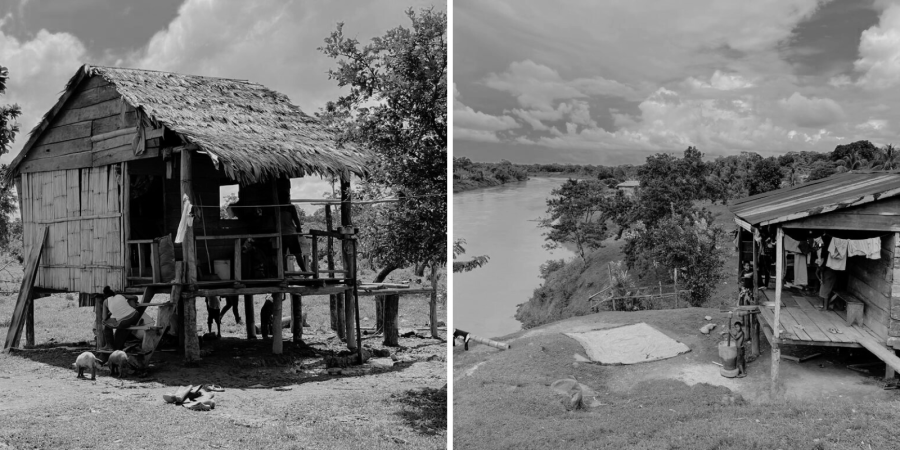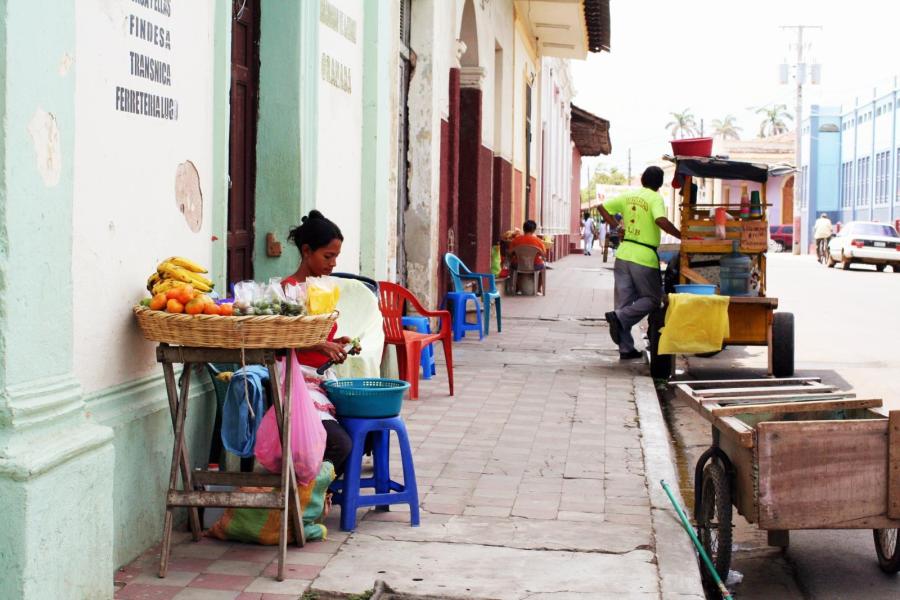I agree with the need to support the Nicaraguan people against U.S. imperialism and against colonialism generally. I agree with the need to stand in solidarity with revolutionary process. The Sandinistas are trying, according to their definitions, to act in a principled fashion as regards the problems on the Atlantic Coast.
The Sandinistas have admitted that they have made mistakes in the past in their dealings with Indians. It seems possible that they are making mistakes in their Indian policy in the present. This is not to state that the Indians are unqualifiedly correct in their own position, only to note that the Sandinistas are not perfect all the time, that they do make mistakes. I don't think that it is a principled position to support their policies which are in error, and I don't think it is counter-revolutionary to disagree with even a revolutionary government when its Indian policy is disastrous to the Indians.
Let us turn to the hard political facts which confront us. I have before me a copy of a document called "Declaration of the Rights of the Indigenous Peoples of the Western Hemisphere" which was adopted at the IITC (International Indian Treaty Council) Conference at Wakpala in 1977. I also have before me a copy of a document entitled "Declaration of the Principles of the Sandinista Popular Revolution in Regards to the Indigenous Communities of the Atlantic Coast" which appeared in the report on the International NGO Conference on "Indigenous Peoples and the Land" held in Geneva, Switzerland 15-18 September 1981. I assume this document to be a true copy of the Sandinista Indian Policy.
The Sandinista document is dedicated to "...Miskitos, Sumos, Criollos, Ramas," a dedication which implies that it is not only an Indian policy but rather a policy toward racial minorities.
Point 5 states that the government stands ready to recognize Indian land rights to "...the lands where they have lived historically in the communities of the Atlantic Coast, already being in the form of communal (sic) or cooperative ownership." That wording basically means that, like the Alaska Native Claims Settlement Act, the Nicaragua government is willing to recognize that the Indians only have rights within the limits of the villages they occupy, and implies that their rights to territory are not recognized. Careful study of the 1977 Declaration will reveal that the IITC and AIM (American Indian Movement) position at the time was that Indian people have rights to all their aboriginal territories. Were the Sandinista position to be adopted by the U.S., the Black Hills would be automatically forfeited and the Sioux claim would be limited to the town limits of the villages now known as Pine Ridge, Wamblee, Calico, etc. All the land in between the villages would be claimed by the U.S. government. Point Five appears on its face to deny all Miskito rights under any treaties and it totally denies the concept of aboriginal rights. It appears to lay the foundation for the taking by the federal government of all the hunting lands which the Miskitos presently use for their subsistence economy. There is no guarantee or even mention of any hunting and fishing rights. It is in absolute contradiction to the 1977 IITC and AIM Declaration.
Point 6 states that "the natural resources of our territory are the property of the Nicaraguan people represented by the Revolutionary State..." The rights of the Indians are limited to "...receive a share of the benefits derived from the exploitation of forestry resources...in conformity with national planning."
Were point 6 to be adopted in U.S. law, it would mean that the Navajo and the Lakota and the Pueblo Indians would have no ownership rights to oil, gas, uranium or other mineral resources, and arguably no rights to water, and they would have no power to determine the path of development of those resources. It would mean that all natural resources would be stolen by the multinational corporations without so much as the formality of recognition of the rights of the Indian people. I would hardly defend the powers or the policy of the history of the United States in its dealings with Indian resources, but point 6 for all practical purposes denies that the Indians even exist or that they have any interest as a people in those resources. The question of ownership of those resources is settled. The Indian people of Nicaragua have no rights.
The Indians of the Atlantic Coast assert their aboriginal rights to land, natural resources, hunting and fishing, traditional government, and so forth. Are we to support Indian people in struggle for their aboriginal rights against puppet regimes like the Samoza government but then abandon them when their rights are threatened by revolutionary governments?
There may or may not be positive aspects of the Nicaraguan policies and practices regarding Indians, but the Declaration of 12 August 1981 represents such a glaring and sweeping denial of the most basic rights of an Indian people to the free and unhindered use of their traditional lands and such a complete denial of their rights to their own natural resources that it is hard to believe that any Indian people who have carefully studied it would support it.
The issue, as we see it, is not whether there are reactionary Miskito or other Indians in or exiled from Nicaragua. The issue involves support of the basic rights of the Indians to exist free of genocidal policies. If an Indian people depend on a hunting territory for their subsistence, and if the free use of that territory is uncategorically denied by a nation state, is not that nation state guilty of a policy of cultural genocide? Should Indian people support that policy?
The documents I am referring to are hard currency in this debate. Whether or not someone or some group is counter-revolutionary falls into the category of an opinion. The documents are pieces of evidence. The Indian movement, so long as I have been a part of it, is a movement which seeks to establish and move forward the Indian rights to land, self-determination, culture, language, hunting and fishing, and against all forms of colonialism, including ideological and economic colonialism. Were the Sandinista Indian policy to be adopted by Canada, for example, the Indian movement in North America would be outraged. Canada would claim (as it very well may claim) that it has no obligations under treaties made between Great Britain and Indian nations, treaties which guarantee Indian rights. The same would apply to the United States. We would march on Washington and Ottawa by the tens of thousands and we would protest to our last breath.
When the same kind of policy is adopted by a revolutionary government - the first in the Americas with a substantial Indian population - it is urged upon us that we must be silent, that we are somehow morally and politically bankrupt if we take the position that the denial of Indian rights is a great wrong because that position has now become counter-revolutionary. (I think that is hogwash.) If the Sandinista government continues this policy, it will build a wall between national liberation struggles and Indians in Central America which no amount of rhetoric about revolution can penetrate, and without the support and involvement of Indians, liberation struggle in Latin America is an impossibility. The support of this policy forces the Nicaragua Indians into a corner from which there is no escape. To embrace the Sandinistas is to surrender all their rights to exist in their homeland, and to oppose it is to fall into the influence of the CIA and the Somocista people.
The only way out is through a compromise policy which includes Sandinista recognition of the existence of Indian nations and landbase, aboriginal rights and the right to an Indian national personality. That path can lead to the forging of a revolutionary alliance which makes clear to the Indians that the support of the Revolution is a support of their own interests, while also offering to the Revolution a powerful ally in the Atlantic Coast peoples.
To give unqualified support to the Sandinista position is in effect to agree that Indian nations have no international personality, that any international personality they might have had is erased by political expediency supporting the revolutionary objectives of the hour. That suggests that the international work undertaken by North American Indian organizations is in contradiction. All the talk about an Indian international personality is qualified by the expectation that that personality will become extinct upon the successful completion of a Leftist revolution. The Right will be ecstatic! Would not the same Indian personality become extinct upon completion of a Rightist revolution, or a military coup?
These are the issues which need to be addressed. Revolutionary governments, like Indians, make mistakes. The Sandinista Indian policy is a mistake, and no doubt some of the positions taken by some of the MISURASATA Indian leaders have been in error also. The Indian organizations in the North are caught in a quandry also, because to criticize a Revolutionary government which is under pressure and potential attack from the Right invites accusations that they have been bought off by counter-revolutionary forces. The question is: is the defense of Indian rights a counterrevolutionary position?
If it is, then the 1977 Declaration is a counterrevolutionary document. It is the diametric opposite of the Sandinista Declaration, and that Declaration is all we have that we can know to be the Nicaraguan government's Indian (and Criollos) position. [So please, tell us how our thinking is in error. Tell us how the defense of the Indian right is counter-revolutionary, and how we should respond to the legal implications of the 12 August 1981 Sandinista document. It is the current legal question, not the philosophical or historical questions or political expediency which concerns us. We get no funding from any political interest on the Left or the Right. We don't care what either side wants us to do or say. We want to support the Indian rights, just as they are laid out in the 1977 IITC and AIM Declaration which was presented in Geneva.] How can we still support the present Sandinista position?
We want to support the Indians of Guatemala and Bolivia and other Latin American countries in their struggle against imperialism and colonialism. How can we do that and still support a document which, if adopted by successful revolutionary governments in those countries, would destroy the Indian people through gross violations of their aboriginal rights?
Article copyright Cultural Survival, Inc.



